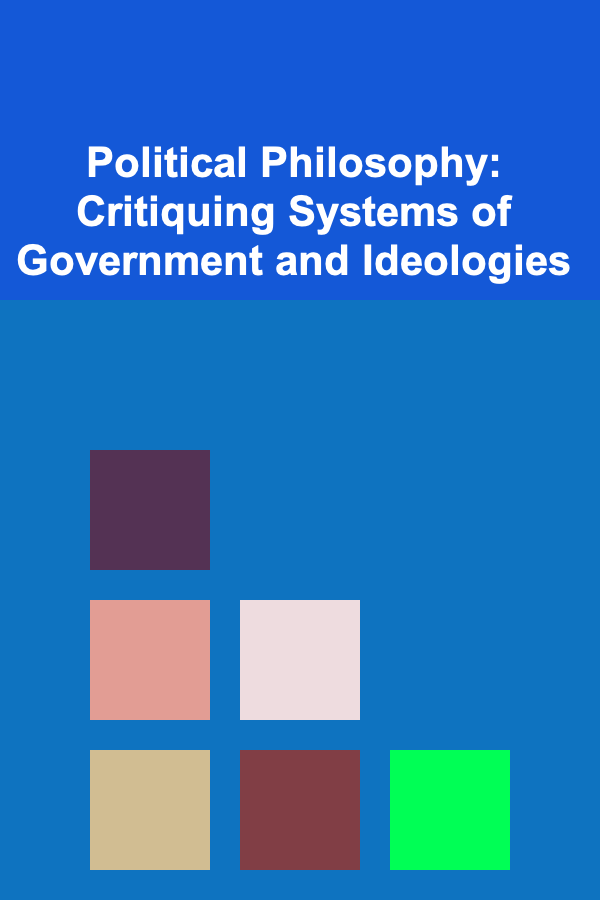
Political Philosophy: Critiquing Systems of Government and Ideologies
ebook include PDF & Audio bundle (Micro Guide)
$12.99$10.99
Limited Time Offer! Order within the next:

Political philosophy is the study of the fundamental questions about government, politics, justice, and the rights and obligations of individuals in a society. At its core, political philosophy seeks to understand how societies should be organized, the nature of power, and the ideal conditions for human flourishing. Over the centuries, political thinkers have developed a range of systems and ideologies that aim to explain the relationship between the individual and the state. This article will critique several major systems of government and ideologies, examining their strengths, weaknesses, and the implications they have for human societies.
Understanding the Basics of Political Philosophy
Political philosophy arises from the need to answer essential questions about society: What is the best form of government? What are the limits of state power? How can political communities reconcile individual freedoms with the needs of the collective? To answer these questions, philosophers have proposed various systems of government and ideologies, each advocating different forms of governance, economic systems, and social relations.
Political ideologies are complex frameworks that combine ethical, social, economic, and political theories. They provide a vision for how society should be organized, how individuals should relate to one another, and how power should be distributed. From democracy and liberalism to communism and anarchism, each ideology reflects different views on freedom, equality, and the role of the state in people's lives.
Liberalism: A Critique of Individual Freedom and Market Efficiency
Liberalism, in its classical form, advocates for a government that protects individual freedoms and promotes market efficiency. It emphasizes limited government intervention, personal liberty, and economic freedom. The idea is that individuals, when left free from excessive state control, will naturally pursue their interests in ways that contribute to the common good.
Strengths of Liberalism
- Emphasis on Individual Rights: One of liberalism's most significant contributions to political thought is its focus on individual liberty and human rights. It argues that people should be free to pursue their interests without undue interference from the state.
- Economic Efficiency: Classical liberalism's support for free markets is based on the belief that economic prosperity arises when people are free to trade and compete. This has led to the rise of capitalism, which, in many cases, has fostered innovation and raised living standards globally.
- Political Pluralism: Liberalism tends to support democracy and pluralism, advocating for a political system where multiple voices and ideologies can coexist. This promotes peaceful coexistence and mutual respect between different social and political groups.
Weaknesses of Liberalism
- Social Inequality: One of the primary criticisms of liberalism is that its emphasis on individual freedom and market forces often leads to significant inequalities. The free market, while efficient, can exacerbate social disparities, leaving large segments of the population without adequate access to resources and opportunities.
- Exploitation: The liberal emphasis on private property and profit maximization can result in the exploitation of workers and the environment. In the pursuit of economic gain, corporations may prioritize short-term profits over long-term societal well-being, leading to social and ecological harm.
- Weak Collective Responsibility: While liberalism places great importance on individual rights, it is often critiqued for neglecting the collective good. When individuals are too focused on their own interests, it can result in social fragmentation, weakening the community fabric.
Socialism: A Critique of Class Inequality and State Control
Socialism, in contrast to liberalism, advocates for the collective ownership of the means of production and the redistribution of wealth to reduce inequality. It posits that capitalism inherently exploits workers, leading to unequal power dynamics and class struggles. Socialists believe that a fairer and more just society can be achieved by establishing systems of public ownership and centralized planning.
Strengths of Socialism
- Economic Equality: Socialism aims to reduce class disparities by redistributing wealth and providing basic needs (such as healthcare, education, and housing) to everyone, regardless of their economic status. This model emphasizes fairness and solidarity among people.
- Worker Empowerment: Socialism advocates for workers to have a say in the decisions affecting their work lives. This could lead to more democratic workplaces where the interests of workers are prioritized, potentially reducing exploitation and improving working conditions.
- Focus on Collective Well-being: Socialism's emphasis on collective responsibility encourages societies to work together for the common good, fostering unity and cooperation rather than individualism.
Weaknesses of Socialism
- Economic Inefficiency: One of the most significant critiques of socialism is that central planning can lead to inefficiency. Without market mechanisms like supply and demand, socialist economies may struggle to allocate resources effectively, leading to shortages, waste, and lack of innovation.
- Authoritarianism: In practice, many socialist regimes have been characterized by centralized, authoritarian governments that suppress political freedoms in the name of economic equality. This has led to a tension between the ideals of socialism and the realities of state control.
- Human Nature: Critics argue that socialism's emphasis on collective ownership and wealth redistribution undermines human incentives. People may lack motivation to work hard or innovate if they are not rewarded based on their contributions, leading to a stagnation of economic growth.
Anarchism: A Critique of Authority and Hierarchical Structures
Anarchism rejects all forms of involuntary and coercive authority, advocating for a society without rulers. Anarchists believe that people can organize themselves cooperatively and live in a way that respects individual freedoms and equality without the need for a centralized state. Various strands of anarchism, including anarcho-communism and anarcho-capitalism, propose different solutions for achieving a stateless society.
Strengths of Anarchism
- Radical Freedom: Anarchism advocates for maximum individual freedom, where individuals are free from oppressive authority and hierarchy. The idea of self-governance and voluntary cooperation allows for a society built on mutual respect and autonomy.
- Critique of Authority: Anarchists provide a powerful critique of all forms of authority---be it governmental, corporate, or social. They argue that power structures inherently lead to exploitation and oppression, which can be avoided in a stateless society.
- Cooperation Over Competition: Rather than being driven by competition, anarchism proposes a society based on voluntary cooperation, where resources are shared equitably and decisions are made collectively.
Weaknesses of Anarchism
- Practical Feasibility: One of the primary criticisms of anarchism is its practical feasibility. A society without a centralized state may struggle to maintain order, protect individual rights, and defend against external threats. The lack of formal institutions to enforce laws could lead to chaos and lawlessness.
- Economic Sustainability: In the absence of a structured economic system, anarchism may face challenges in ensuring economic productivity and stability. Without a clear framework for managing resources, the economy might face inefficiencies or inequalities.
- Vulnerability to Exploitation: While anarchism emphasizes voluntary cooperation, critics argue that a stateless society could be vulnerable to exploitation by individuals or groups with power and resources. The lack of central authority could make it difficult to prevent abuses and ensure fairness.
Conclusion: The Search for an Ideal System of Government
Political philosophy offers a rich and complex terrain of thought, where various ideologies provide different answers to questions about justice, equality, and the nature of governance. While each system of government---whether liberalism, socialism, or anarchism---offers compelling arguments about how societies should function, each also comes with its own set of challenges and contradictions.
Liberalism, with its emphasis on individual rights and market freedom, fosters innovation and personal liberty but often leads to inequality and exploitation. Socialism seeks to rectify economic injustice and promote collective well-being but struggles with inefficiency and the dangers of authoritarianism. Anarchism challenges the legitimacy of all forms of authority and calls for radical freedom, yet it faces questions about its feasibility and vulnerability to exploitation.
Ultimately, no political system is flawless, and each must be continually evaluated in the context of changing social, economic, and political realities. The ideal system of government may lie not in a perfect ideology, but in a blend of various ideas that can adapt to the needs of society while upholding justice, equality, and individual freedoms.

How to Create a Stylish Home Office on a Tight Budget
Read More
How to Declutter Your Home Before a Deep Clean
Read More
How to Implement a Minimalist Approach to Home Storage
Read More
How to Plan a Memorable Backyard Party on a Budget
Read More
How to Protect Your Home from Unwanted Visitors or Solicitors
Read More
How to Sell Digital Products Successfully for Bloggers
Read MoreOther Products

How to Create a Stylish Home Office on a Tight Budget
Read More
How to Declutter Your Home Before a Deep Clean
Read More
How to Implement a Minimalist Approach to Home Storage
Read More
How to Plan a Memorable Backyard Party on a Budget
Read More
How to Protect Your Home from Unwanted Visitors or Solicitors
Read More